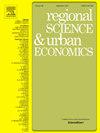交通基础设施外生改善对生产率和工资的影响:可达性和大带桥
IF 2.9
2区 经济学
Q1 ECONOMICS
引用次数: 0
摘要
在本文中,我们研究了交通基础设施质量的巨大且非常局部的离散冲击对生产率和工资的影响,即连接哥本哈根地区与邻近的福嫩岛和丹麦大陆的大带桥的开通。我们关注两个效应:(i)可达性外部性,通过城市一级可达性指标的变化来捕捉;(ii)在大桥通车后,更短的交通时间使工人与工作更匹配。我们可以将可达性和匹配效果分开,因为更好的匹配只有在大桥开通后通过新的通勤穿越大带才能实现。我们的研究结果表明,可达性的提高对生产率和工资都有显著的积极影响,后者更加本地化。改善劳动力市场匹配的生产率效应大于可及性效应,但它们仅限于一小部分公司。我们发现更好的匹配带来了适度的工资效应,这表明,除了与大桥开通相关的通勤成本节约之外,员工的工资还会有小幅增长。总的来说,这些估计表明,公司从大桥的开通中获得的利益比工人更多。此外,大桥的受益者主要是受过高等教育的男性工人,而且它加剧了工资不平等。本文章由计算机程序翻译,如有差异,请以英文原文为准。
Productivity and wage effects of an exogenous improvement in transport infrastructure: Accessibility and the Great Belt Bridge
In this paper, we study the productivity and wage effects of a large and very localized discrete shock in the quality of transport infrastructure, viz. the opening of the Great Belt Bridge connecting the Copenhagen area with the neighboring island Funen and the mainland of Denmark. We focus on two effects: (i) an accessibility externality, captured via changes in an accessibility indicator at the municipal level; (ii) better matching of workers to jobs, enabled by to the shorter travel times after the opening of the bridge. We can disentangle the accessibility and matching effects, because better matching is only realized via new commutes crossing the Great Belt after the opening of the bridge. Our results show that the increased accessibility had significant positive effects on productivity as well as wages, the latter being much more localized. The productivity effects of improved labour market matching are larger than the accessibility effects, but they are restricted to a small share of the firms. We find a modest wage effect of better matching, suggesting that employees get a small wage increase on top of the commuting cost savings associated with the opening of the bridge. Overall, the estimates suggest that firms benefited more from the opening of the bridge than did workers. Moreover, the bridge benefited mainly highly educated and male workers, and it increased wage inequality.
求助全文
通过发布文献求助,成功后即可免费获取论文全文。
去求助
来源期刊

Regional Science and Urban Economics
Multiple-
CiteScore
5.30
自引率
9.70%
发文量
63
期刊介绍:
Regional Science and Urban Economics facilitates and encourages high-quality scholarship on important issues in regional and urban economics. It publishes significant contributions that are theoretical or empirical, positive or normative. It solicits original papers with a spatial dimension that can be of interest to economists. Empirical papers studying causal mechanisms are expected to propose a convincing identification strategy.
 求助内容:
求助内容: 应助结果提醒方式:
应助结果提醒方式:


